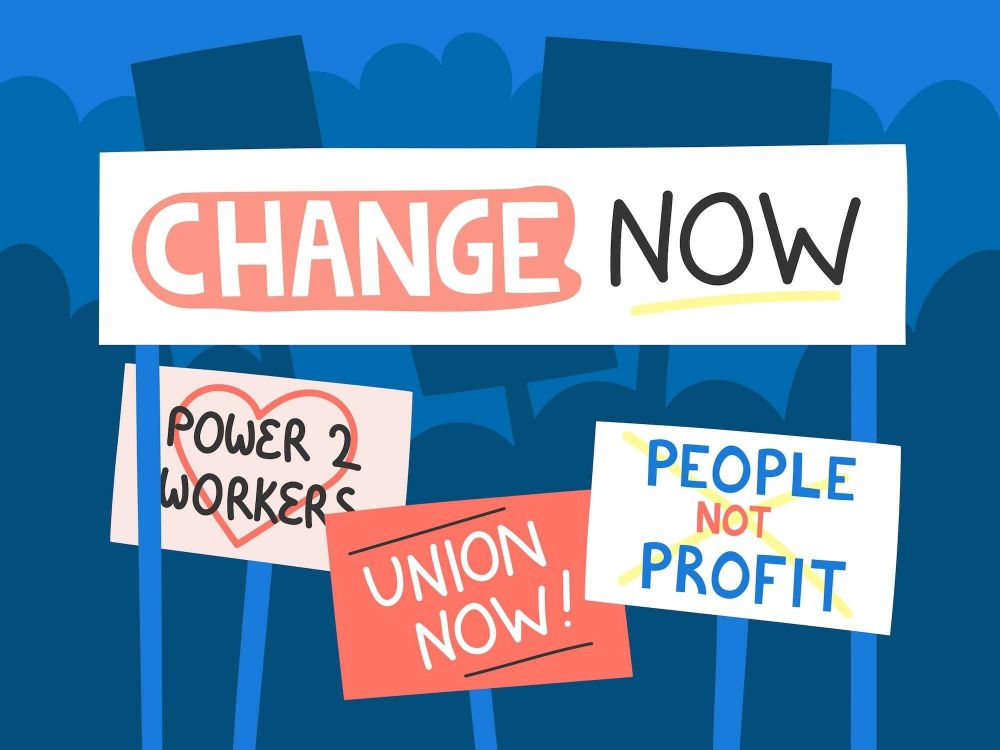
Federal workers stock food banks, as judges step in to ensure SNAP payments
Federal courts are temporarily blocking the Trump administration from pausing Supplemental Nutrition Assistance Program (SNAP) payments during the ongoing government shutdown.
But without a long-term solution in place during the second-longest congressional funding lapse, federal employees, many of them furloughed or working without pay during the shutdown, are ensuring food pantries remain stocked.
The Federal Unionists Network, a coalition of federal workers and their allies, led a food drive Thursday outside the Agriculture Department’s headquarters. The initiative raised over $10,000 for the Capital Area Food Bank.
The food drive comes as some federal workers who have missed one full paycheck and a partial paycheck during the shutdown are tightening their belts. Some are also turning to food banks and financial aid programs.
Kalynda Gonzales Stokes, a furloughed program officer at the National Institutes of Health volunteering at the food drive, said she sympathizes with colleagues in the federal workforce who are having to show up to work without being paid on time.
“The thing that’s the most frustrating is that the government can do the right thing. They could pay people right now,” Stokes said, speaking in her personal capacity. “It’s in their power. But it’s on us, the people who are furloughed, to come up with all the solutions.”
The Trump administration has repurposed funds to keep active-duty military and 70,000 federal law enforcement personnel at the Department of Homeland Security from missing a paycheck. But it has not used these same extraordinary measures to ensure civilian federal employees get paid on time.
“We got the people that we want paid, paid,” President Donald Trump told reporters at the White House earlier this month.
Stokes said her husband, who doesn’t work for the federal government, is being paid on time and covering day-to-day household expenses — including daycare for the youngest of their two children.
Despite the belt-tightening, Stokes said the furlough has been a “break from the trauma” that federal employees have experienced during the Trump administration.
“It was so traumatic every day at work, being worried if you’re going to be fired, if you’re saying the wrong thing, if you’re saying the banned words,” she said.
A federal court earlier this week put an indefinite hold on the administration proceeding with widespread reductions-in-force for about 4,000 federal employees, or issuing new RIF notices, while the case proceeds through the court.
Alexis Goldstein, a Consumer Financial Protection Bureau employee, said she understands the precarious nature of federal employment under the Trump administration. Her agency has been targeted for elimination, and she said she’s been fired and rehired twice.
“We are worried that what happened to us may happen to every other agency, if there aren’t demands that are met as a condition of ending the shutdown,” she said.
Goldstein is an exempt employee, and is working and being paid on time during the shutdown. But other federal employees aren’t sure when they’ll receive their next paycheck.
“This is a pretty fundamental issue, when people don’t eat. I wanted to be out here, because I really wanted to do something about it. I was fortunate enough that I’m not furloughed at the moment. That could change tomorrow,” Goldstein said. “We are all really motivated to do everything that we can to help the public, and that’s why we became government workers in the first place.”
Goldstein, a member of the National Treasury Employees Union Chapter 335 and a FUN volunteer, said she left a nonprofit job to join the federal government more than three years ago.
“The reason I joined government is it’s the entity that can do the most good,” she said. But in the absence of funding for these programs, she said it can “also do the most harm.
“SNAP is one of the examples of those programs that people can’t live without, or at least, we’ll go hungry without. That’s exactly the kind of staff that motivated me to go to government,” Goldstein said.
Judges in two federal courts blocked the Trump administration from halting SNAP benefits for November.
A ruling Friday from the U.S. District Court for the District of Massachusetts is requiring USDA to use its contingency funds or whatever resources are available to ensure there is no disruption to food assistance.
Judge Indira Talwani did not formally grant the temporary restraining order sought by 25 attorneys general and governors. But her ruling directed the Trump administration to take immediate steps to deploy funding and report its plan to the court by Monday, Nov. 3.
In a separate case, a federal judge in Rhode Island granted a nationwide TRO requiring the administration to restore SNAP benefits as soon as possible.
Agriculture Secretary Brooke Rollins told reporters on Friday that USDA’s contingency funds cover less than half of the $9.2 billion required for full SNAP benefits in November. Rollins said USDA’s contingency fund is “only allowed to flow if the underlying program is funded.”
“It’s called a contingency fund, and by law, a contingency fund can only flow when the underlying fund is flowing,” she said.
Rollins said some of USDA’s furloughed staff are taking second jobs to pay their bills during the shutdown, and applauded employees who are working without pay during the shutdown.
“As the shutdown continues, hundreds of thousands of federal employees are not receiving a paycheck,” she said.
House Speaker Mike Johnson (R-La.) called the lawsuits a “frivolous piece of litigation,” and called on Senate Democrats to vote on the House-passed continuing resolution to end the shutdown.
“The administration has done all it can to keep this program afloat, but the limits have been reached here,” Johnson said.
Rep. Don Beyer (D-Va.) said on Thursday that the Trump administration’s attempted pause of SNAP benefits “is heartbreaking and is totally unnecessary.”
“The shutdown protocol is clear. All the guardrails, even in previous shutdowns, like the one when Donald Trump shut down the government in his first administration, all the SNAP benefits stayed in place. There’s no reason they can’t be paid right now,” Beyer said.
Rep. James Walkinshaw (D-Va.) said his constituents see the pain of the shutdown in the context of the pain the Trump administration has inflicted on the federal workforce this year. He said many federal employees in his district have been fired or laid off this year, while others have been impacted by the mass cancellation of federal contracts and the shuttering of agencies like USAID.
“I take it very seriously for federal workers who are missing their paychecks, and I want to see a bipartisan negotiation to end the shutdown, address the health care issue — which will also impact federal workers, especially if Trump fires them — and secure some protections to prevent more illegal firings of federal workers moving forward. I think we have to find a way to do all of those things in this moment,” Walkinshaw said.
Jessica Shaheen, a former associate administrator for SNAP at USDA’s Food and Nutrition Service, said SNAP is the “heart and soul of our food assistance program.”
“Many community-based organizations work together with SNAP, but SNAP, that’s where the core is. Somebody’s got to do the heavy lifting, and that is SNAP,” she said.
Shaheen, who spoke to federal employees gathered for the food drive, applauded their efforts.
“I know that most of you are public servants,” she said. “You want to meet the mission, don’t you? That’s all you want to do.”
George Nwanze, a volunteer with the Northwest Community Food Pantry in D.C., said his organization has been distributing food aid for the past four years, “but we’ve never been busier than we are right now.”
Nwanze said the group distributed food aid to about 50 recipients when the food pantry was first launched. Now, it’s grown to over 400 recipients.
“The need is tremendous, and it is urgent,” he said.The post Federal workers stock food banks, as judges step in to ensure SNAP payments first appeared on Federal News Network.


















